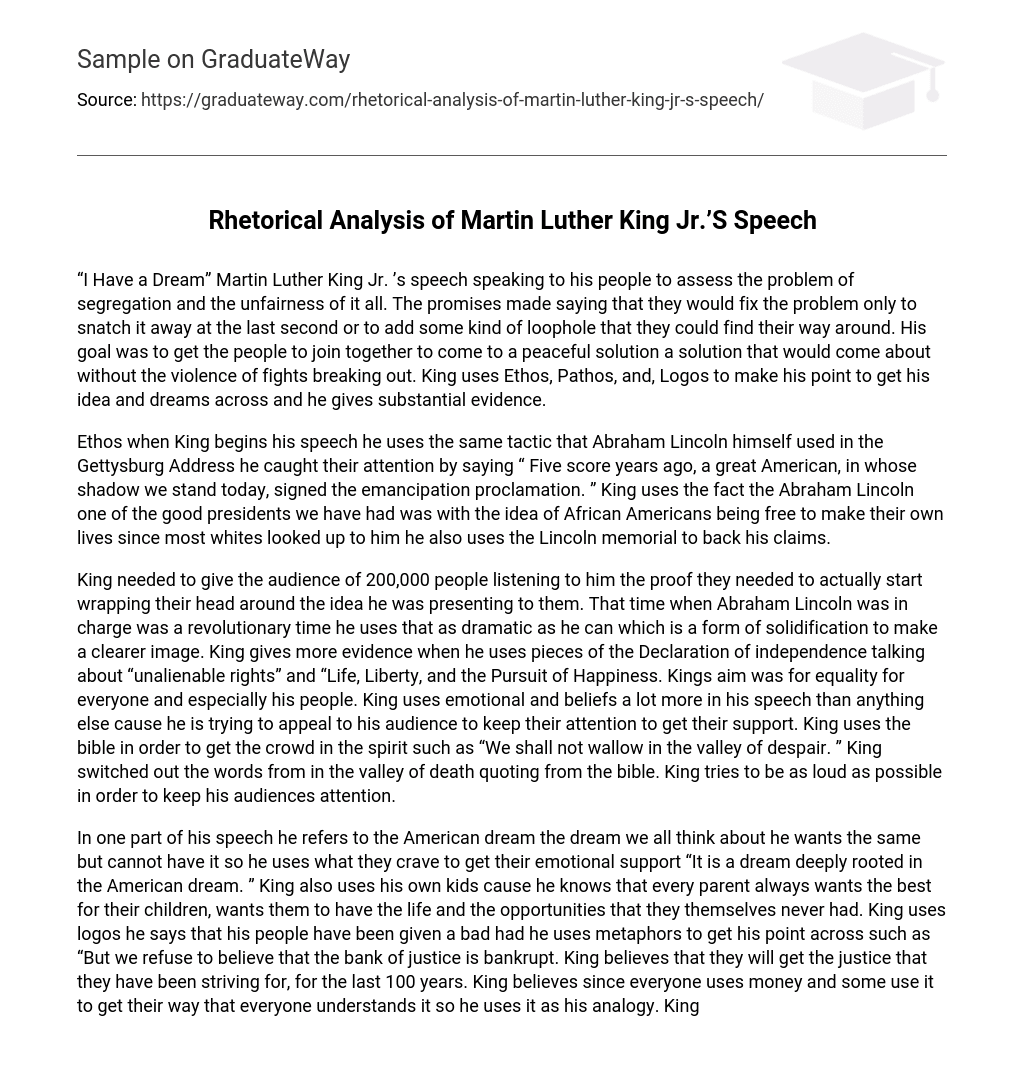“I Have a Dream” is Martin Luther King Jr.’s speech wherein he addresses the issue of segregation and its unjust nature. He highlights the broken promises that offer a temporary solution or include loopholes that undermine progress. King aims to unite people in pursuing a peaceful resolution that negates violent outbreaks. To convey his ideas and dreams effectively, he utilizes Ethos, Pathos, and Logos, presenting significant evidence.
When King starts his speech, he employs the same strategy that Abraham Lincoln used in the Gettysburg Address. He captures their attention by stating, “Five score years ago, a great American, in whose shadow we stand today, signed the emancipation proclamation.” King utilizes the fact that Abraham Lincoln, who was considered one of our notable presidents, supported the notion of African Americans having the freedom to shape their own lives. Given that many white individuals revered Lincoln, King also relies on the symbolism of the Lincoln memorial to support his assertions.
King sought to provide proof to the audience of 200,000 people that would enable them to comprehend the idea he was presenting. He strategically utilizes the revolutionary era when Abraham Lincoln was in power to create a dramatic impact that strengthens his argument. Additionally, King cites excerpts from the Declaration of Independence, specifically referencing “unalienable rights” and “Life, Liberty, and the Pursuit of Happiness,” to further support his aim for equality, especially among his own people. In his speech, King relies more on emotional appeals and personal beliefs to captivate his audience and garner their support. By incorporating biblical references, such as “We shall not wallow in the valley of despair,” King aims to uplift and inspire the crowd. He replaces the words “valley of death” with a biblical quote to resonate with the audience. Above all, King’s intent is to grab and maintain the attention of his listeners by projecting his voice as loudly as possible.
King discusses the concept of the American dream in his speech, a dream that is universally desired. However, he acknowledges his own inability to achieve this dream and instead relies on the aspirations of others for emotional support. He states, “It is a dream deeply rooted in the American dream.” Additionally, King recognizes that every parent wishes for their children to have better opportunities than they had. To effectively convey his message, King uses logos by highlighting the challenges faced by his people. He employs metaphors such as “But we refuse to believe that the bank of justice is bankrupt” to make his point clear. King firmly believes that after a century of striving for it, justice will ultimately prevail. By using money as an analogy, which everyone can understand, King suggests that his people are being treated unfairly and should be granted equal rights like the white population. His speech incorporates various rhetorical strategies, making it a groundbreaking address that will undoubtedly be remembered throughout history for its masterful delivery.
King’s speech reinvigorated the stagnated process of segregation, propelling it forward once more. The speech instilled hope in individuals, urging them to envision a world where equality prevailed and they were no longer treated as inferior. It taught them that the sole disparity between themselves and white individuals was their skin color, which ultimately held no significance beyond its pigmentation.
Sited
“American Rhetoric: The Power of Oratory in the United States.” American Rhetoric: The Power of Oratory in the United States. N. p. , n. d. Web. 01 Oct. 2012.
.





